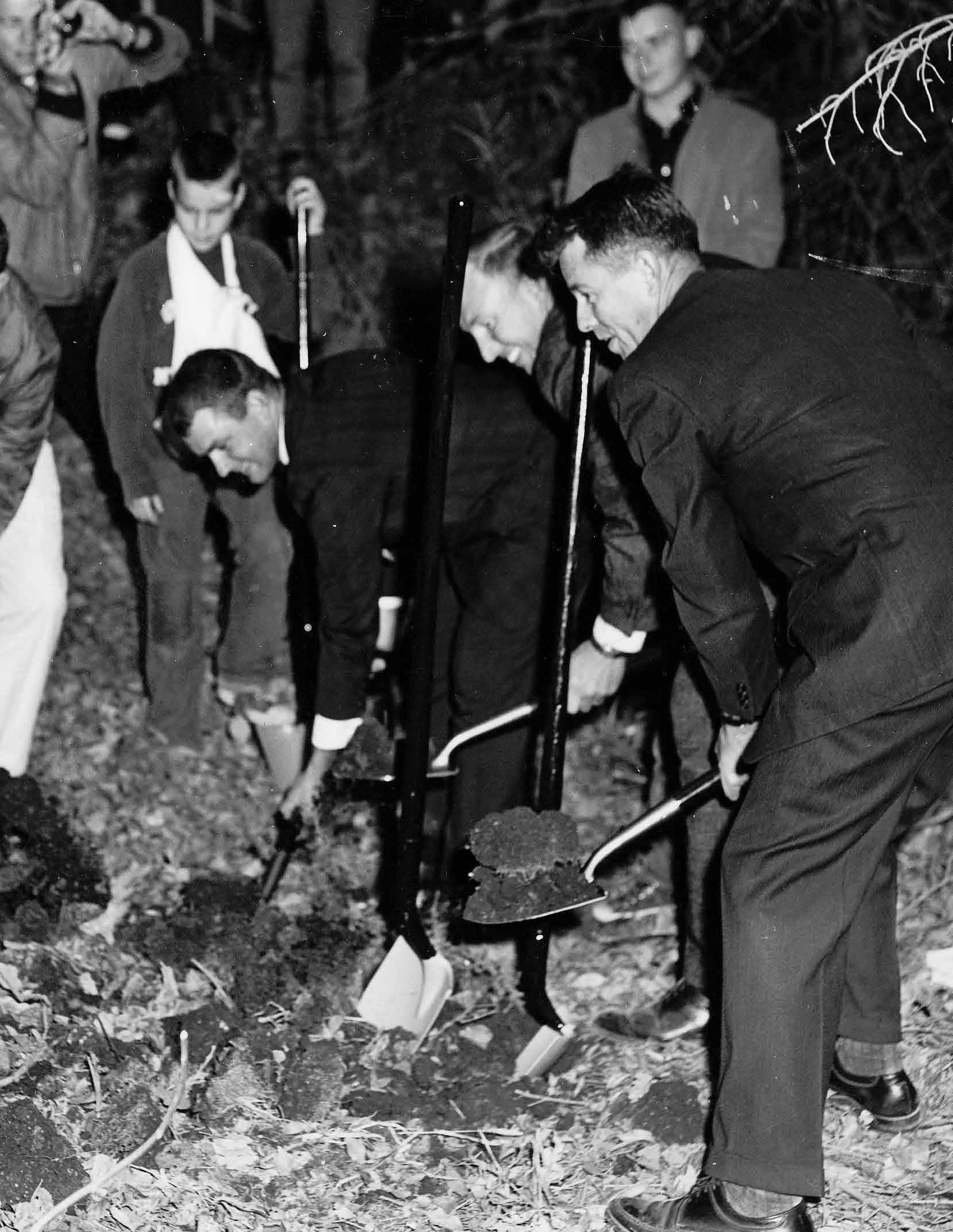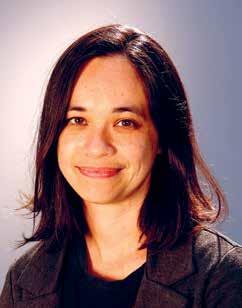
7 minute read
ASK THE EXPERTS: SOCIAL JUSTICE
Assistant Professor of Education Sara Lam ’03 talks about teaching social justice and understanding social change through a liberal arts lens.
As the anti-racist movement rocks the country in the wake of George Floyd’s death, the liberal arts can provide a lens for understanding and action. So we asked Assistant Professor of Education Sara Lam ’03, who specializes in teaching for social justice, what we can do in our own lives to learn and take action for change.
Q: You have a UMN Morris liberal arts background: how do you think it’s prepared you to understand and act on this moment?
A: Racism permeates American society, and institutes of higher education are not immune to it. The first class I had at UMN Morris was my First Year Seminar about Asians in America, which helped me contextualize my experiences as an Asian who had just moved to the US. I remember student life at UMN
Morris being not only active, but also activist-oriented, and this was a source of learning and support. I participated in student organizations, mentorship and training focused on facilitating dialogue about justice. As an education major, I engaged in fieldwork in a wide range of contexts, international, domestic, and in an Indigenous nation. This opened my eyes to inequities in education.
Q: You help teachers prepare to talk with kids about justice and inequity. How do you equip them to have those conversations, and are there lessons there for parents, too?
A: I show my students, who are future educators, that racism and other forms of oppression are not just interpersonal, but are systemic. Racism is structured into our school system in the form of curricular bias, discipline practices, standardized testing, and more. I want students to see that it’s not enough for teachers to be “colorblind,” because that allows those forms of racism to continue working. Instead, antiracist teachers recognize how educational racism harms our students and actively work against it. I teach students methods for practicing antiracist teaching, such as amplifying the knowledge and histories of marginalized groups in the curriculum and resisting discipline practices that marginalize or even criminalize students. This applies very directly to parenting. Antiracist parents are not colorblind. They reflect on how their parenting decisions might reinforce privilege and inequities. They teach their children to recognize and take action against injustice.
Q: How would you suggest people educate themselves on issues of social justice?
A: Listen to and learn from the people who are most directly affected by the issue.
Many authors, speakers, and artists have worked to share their knowledge and experiences of oppression and resistance. Engage with their work and amplify it by recommending it to others.
Q: What’s one book everyone should be reading right now?
A: So You Want to Talk about Race by Ijeoma Oluo
About Lam Lam is an assistant professor of education and the campus Global Student Teaching coordinator. She holds a PhD from the University of Wisconsin, Madison, EdM from Harvard University, and a BA from UMN Morris. Her expertise includes rural and community-based education, international and multicultural education, and education for social justice.
SUPPORTING STUDENTS AND ADVANCING EQUITY
The Racial and Social Justice Scholarship was created in memory of George Floyd and to commemorate the events of summer 2020. The scholarship advances equity, diversity, and inclusivity on the UMN Morris campus. It will be awarded to students who demonstrate a commitment to antiracism, racial justice or social justice. Preference will be given to students who will enhance the diversity of UMN Morris’s student body. After the eligible pool of candidates for the award are selected, an additional consideration (plus factor) will be given to Black or African American students if these populations are underrepresented at the Morris campus at the time of the award. To learn more contact Susan Schmidgall, Director of Advancement at sschmidg@morris.umn.edu or 320-589-6160.
The days leading up to Commencement, normally some of the busiest of the year, saw a quiet campus mall and near-empty halls, as students, faculty, and staff studied and worked from home.
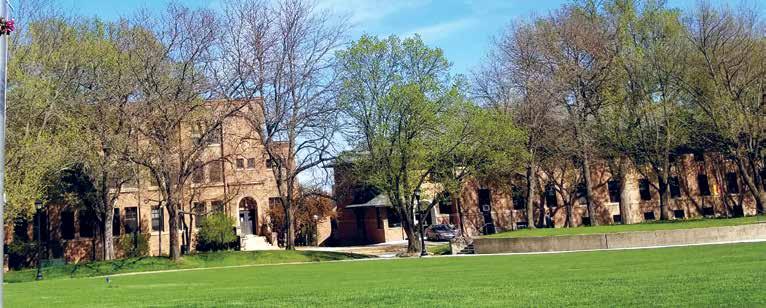
TIMES LIKE THESE
UMN Morris and the COVID-19 Crisis
The global COVID-19 pandemic has touched every corner of the globe, including UMN Morris. Life today looks like nothing we’ve seen in recent memory. But in the midst of these extraordinary times, the important things about UMN Morris—student support, campus culture, faculty scholarship—haven’t changed. See how the campus community is throwing what it has at the fight against COVID-19. spirit home.”
SUPPORT FOR STUDENTS IN TIMES OF UPHEAVAL: SAGE
This spring the COVID-19 pandemic presented unprecedented challenges for our students: academic upheaval, health concerns, loss, grief, and unanticipated financial hardships. And yet, true to form, members of our community continued to do what they’ve always done best: support and care for our students.
In the midst of an economic crisis, faculty, staff, alumni, and friends continued to contribute to the Student Assistance Grant for Emergencies (SAGE) fund. SAGE was created to provide quick-response emergency grants for short-term financial emergencies, enabling a student to remain in school, rather than being forced to take a leave of absence or drop out.
Since the COVID-19 pandemic began, 27 students have received SAGE funds to assist them with food, medical bills, technology, housing and other unforeseen expenses—more than twice as many as last year.
“Our students have never needed SAGE more than they do right now,” writes Chancellor Michelle Behr. “Thank you for supporting them in this time of need.”
BETTER TOGETHER, EVEN WHEN WE’RE APART: #MORRISMISSION
No matter where they were in the spring semester, students, staff, and faculty worked hard to maintain the personal relationships and close-knit ethos that distinguish our campus from other colleges and universities. From organizing the gaming sessions, beading challenges, discussions, lectures, and language tables, to displaying art on virtual media, UMN Morris stepped up and reached out to maintain the community we know and love. The most popular of these programs was #MorrisMission. Each Wednesday Student Activities invited the community to take part in weekly challenges ranging from “taking out” the recycling to showing Cougar pride and more.
“We wanted to create a virtual program that would engage students, show off their creativity, and create greater digital content for Morris,” says David Israels-Swenson, senior director of Student Activities, Health and Wellness. “We also saw the program as an opportunity to put campus faces and people that students are used to seeing in front of them even though we were all far apart.”
“The cancellation of in-person classes caused us, students, to be far from our friends, peers, and community,” says Hannah Rhea Sajulga, “Saj,” ’20. “#MorrisMission gave us a chance to be creative and think out of the box. Seeing what others would come up with every week and interaction through likes and comments made the distance feel less. #MorrisMission brought the Morris #MorrisMission social distancing challenge, to hosting virtual
The fall edition of #MorrisMission launched August 31. To see the winning entries, prompts, and more, visit z.umn.edu/morrismission.
To learn more about how COVID-19 is affecting the campus community, visit morris.umn.edu.
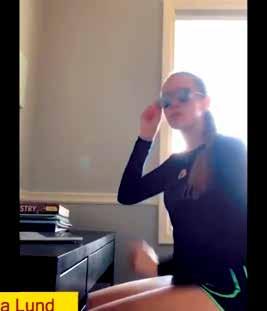
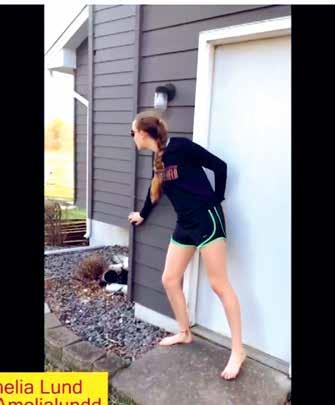
Amelia Lund won the Week Four Morris Mission with a Mission Impossible-style action sequence: “taking out” the recycling.
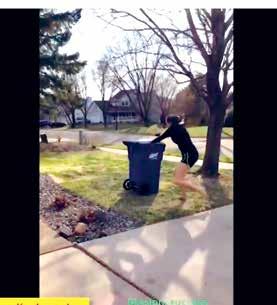
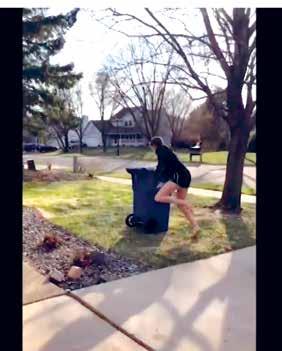
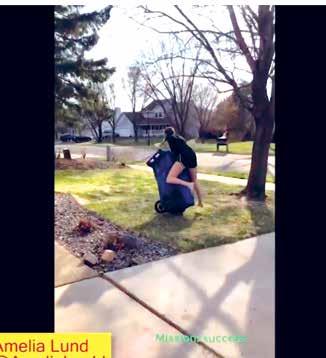
UMN COVID-19 EXPERTS
The University of Minnesota isn’t just responding to COVID-19: we’re changing its trajectory. Meet some of the experts helping us understand how to navigate the pandemic and its effects on our lives every day.
FACULTY
Stephen Burks
Professor of Economics and
Management
Expertise: How COVID-19 impacts the trucking industry and supply chain
Resource: Truckers & Turnover
Project Heather Peters
Associate Professor of Psychology
Expertise: Culturally sensitive interventions and programs for dealing with COVID-19
Resource: Wicozani Instrument
ALUMNI
Kaz Nelson ’02
Associate Professor and Vice
Chair of Education, Medical
School, Twin Cities
Expertise: Anxiety, distress, how confineness is affecting people; how interactions with people are changing, fallout when crisis is over
Resource: The Mind
Deconstructed Podcast
THE BIG PICTURE
This year marks the 60th anniversary of
the University of Minnesota Morris. As
we look to the future, we nod to the past
and the foundation laid by our founders.
Founders like Ed Morrison (far left) and
Rodney Briggs (far right), seen here at

the groundbreaking of Gay Hall.
